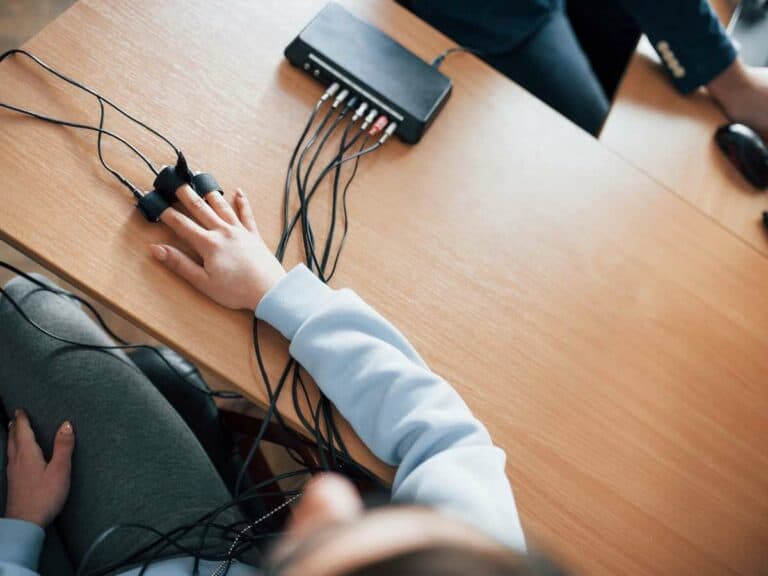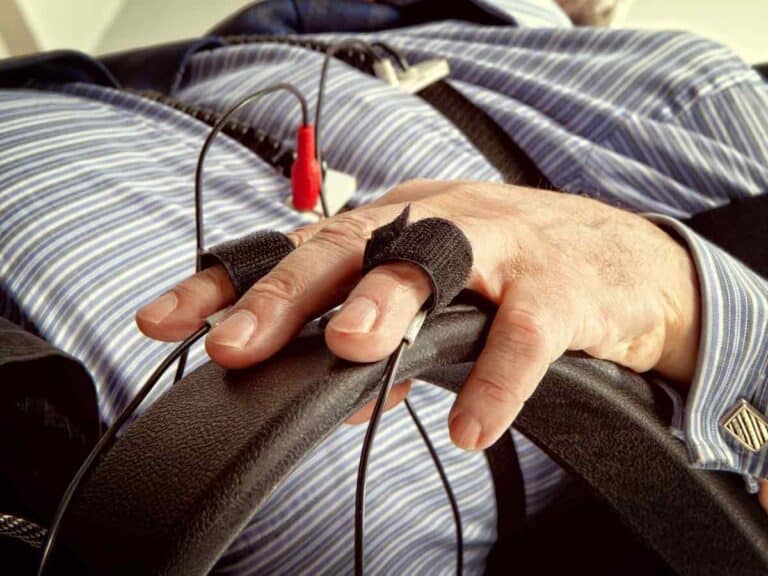Can an Innocent Person Fail a Lie Detector Test?
The general consensus is that polygraphs are only 80% to 90% accurate. This means that there is a 10% to 20% chance that a polygraph exam is wrong. Should you be worried if you are not guilty of anything?
Innocent people can absolutely fail lie detector tests. A false positive result is likely if individuals with nothing to hide feel stressed or anxious during a polygraph just like guilty examinees. Innocent people may also fail polygraphy if they overanalyze the questions or fail to completely understand the questions asked by the polygraph examiner or polygrapher.
In this article, I will talk about the things that can make an innocent person get a false positive polygraph result so that you can do your best to avoid them.

When Innocent Examinee Reacts Like a Guilty Examinee
When it comes to determining whether a person who is undergoing a lie detector test is being truthful or deceitful, the polygraph examiner checks if the physiologic reactions picked up by the instrument are comparable to those of an innocent person or more similar to those of a guilty person.
Reacting just like how a lying person would when you are telling the truth can make it appear as though you are trying to deceive the examiner and pass the test.
In this case, it’s not unlikely for a false positive result to come your way after about 24 hours.
There are a handful of things that can make you fail a lie detector exam simply by giving the machine the same physiologic changes that are normally encountered in an individual who is stating lies in the presence of a polygraph examiner.
Here are some of the things that can make you look guilty even if you’re not:
Familiar with the crime
According to a recent report by Gallup, which is a Washington, DC-based analytics and advisory company, up to 14% of US adults say that they were personally victimized by a crime.
If you are one of them and get subject to a lie detector test for a crime that’s similar to what you have experienced in the past, there is a possibility for you to fail the examination. That’s because it could bring back strong memories, causing increased blood pressure, heart rate and other physiologic processes a polygraph machine measures.
Guilty of a similar crime
Committed the same crime for which you are undergoing a polygraph test in the past? Then the machine’s reading may make it look like you are guilty of the wrongdoing someone else has committed. It’s very much likely for you to react in the very same manner as the perpetrator even though you were involved in a different but similar crime before.
Even if you have already paid your dues by spending some jail time or shelling out some penalty money, being asked a question related to it may cause your body to react like you were the one accountable.
Indirect involvement
In criminal law, an accessory is someone who becomes equally guilty of the misdeed of another by voluntarily and knowingly assisting the criminal before or after the crime. So, in other words, he or she is an accomplice, as opposed to an abettor — someone who encourages or assists the criminal during the act itself.
Chances are you will fail the lie detector test if you know for yourself that you are an accessory to a crime. In this case, you don’t have to be directly involved with the offense someone has committed to appear guilty.
Knowing who the perpetrator is
Got an idea of who is directly responsible for the crime? Is the person someone you would like to protect and save from ending up in jail? Then don’t be surprised to get a false positive lie detector test result sooner or later.
Trying to cover for the guilty individual can make you feel guilty, which can then increase your stress levels. And this can be picked up by the machine and then translated by the polygraph examiner as an act of deceit. Even if you are not directly involved with the crime, knowing the one who did it can make you appear guilty.
Misunderstanding the question
In some instances, something as seemingly harmless as failing to understand a question and then reacting to it can harm your polygraph examination, making it look like you are lying.
Good news: an experienced polygraph examiner usually repeats a question at least 3 times to ensure consistency. You can always change your answer if you didn’t understand the question the first time. But steer clear from overanalyzing the question because it’s one of the most common reasons for having a false positive polygraph test result.
Real-Life Cases of False Positive Results
According to 10 individual field studies, the rate of false positive results, or results in which innocent persons were deemed deceitful, ranged anywhere from 0% to 75%. But the average rate was 19.1%. On the other hand, the rate of false negatives, or results in which deceptive persons appeared non-deceptive, averaged 10.2%.
So, in other words, almost 1 in every 5 lie detector tests resulted in a false positive result.
There is no need for you to personally know some people who were completely innocent but were reported by polygraph examiners to be guilty just to get the idea that getting a false positive is more common than you think.
On the internet, there are tons of lie detector horror stories, many of which involve truthful individuals appearing deceitful. However, the unfavorable experiences of others should not intimidate you from having your polygraph — you can learn from what happened to them and use it to your advantage to get an accurate result.
Aroused by fire
A Reddit user said he had an officemate who had to take a polygraph examination twice as a part of the pre-employment process because he failed the first one.
The said officemate admitted that he was very nervous during the initial lie detector exam. Also, he failed to very well understand one of the questions, which was “are you sexually aroused by the sight of fire?” Not wanting to ask the examiner to repeat the question for fear of appearing nervous, the guy simply answered “yes”.
Because of that incident, the Reddit user nicknamed his officemate “fire starter”.
A baseless allegation
Another Reddit user shared a story that was told by his AP Psychology teacher in high school about how inaccurate a polygraph exam can be and thus make totally innocent people appear completely guilty.
The story involved a divorcing couple who couldn’t agree on what to do with their children.
Allegedly, the father was so desperate to get custody of all the kids that he spread the news that the mother was molesting one of the kids. And when the woman, who was not aware of the indictment, was undergoing a lie detector test, she was shocked when the examiner asked her if she indeed put her son’s privates in her mouth.
And because the question surprised her, it wasn’t surprising at all that the physiologic changes recorded by the polygraph machine made the mother appear as though she was lying.
Non-user living with users
Then there’s this Quora user who failed all 3 lie detector exams he had to undergo as a part of the requirement for a work release live-in program, where everyone has to live in the same housing facility that serves as a bridge between living in prison and living in the community.
Because he was living with others in the same program who were using marijuana, his stress levels might have increased when he truthfully answered no when asked if he was using drugs.
On the other hand, a few of the guys who were into drugs passed their lie detector tests.
A future cop with a happy ending
Another Quora user who once applied as a police officer shared his false positive story.
It’s no secret among polygraph aficionados that having a lie detector test is a part of the pre-employment screening process for various federal, state and local government agencies. On the other hand, most private companies and employers are prohibited from doing the same, says the Employee Polygraph Protection Act (EPPA).
Throughout the polygraph test, the said individual was completely being truthful. When the result came out, however, it was deemed by the examiner that he was lying in every question thrown his way.
Fortunately for the guy who was aspiring to be a police officer, he was allowed to retake the exam.
Most of those who get a false positive result the first time get it right the second time. True enough, he passed his second lie detector examination, giving the same answers to the same questions.
British TV show canceled
In 2019, the long-running British tabloid talk show The Jeremy Kyle Show aired its last. It was canceled after the tragic death of a former guest, which the show may have caused or contributed to.
Similar to The Jerry Springer show, which was an American scripted syndicated tabloid talk show that ran from 1991 to 2018, The Jeremy Kyle Show featured Jeremy Kyle who served not only as the host but also as some sort of a referee amidst guests who attempt to display their conflicts and relationship issues in front of a live studio audience.
It’s not uncommon for the said show to have a polygraph machine around to help settle disputes.
Earlier in the year when The Jeremy Kyle Show was canceled, a guest named Steve Dymond, 63 years of age, failed the lie detector test. He was found lifeless in his home days after he took a polygraph examination in the TV show. The cause of death: morphine overdose and left ventricular hypertrophy.
According to Dymond, he agreed to appear in The Jeremy Kyle Show to prove that he didn’t cheat on his ex-fiancée. But he failed the lie detector test and was booed by the audience and a failure by the host.
Passing a Polygraph Test When Nervous
Being anxious or having an anxiety disorder is one of the main reasons why someone who is innocent may appear guilty as a result of a false positive lie detector result.
Because you know for a fact that you can easily fail the examination simply for being nervous, it’s possible for you to end up even more nervous. This can cause physiologic changes in you during the test that reflect the physiologic changes in someone who is trying to pass the test and get away with whatever he or she is guilty of.
Fret not if you are certain you did nothing wrong but fear that being nervous can get you incriminated.
There are certain steps that you may take in order to fend off a false positive result. See which of the following you can do before and/or during the lie detector exam with very little to no effort:
It’s fine to be scared
Even the most innocent person with nothing to hide can feel anxious about having a polygraph exam. Mental health experts say that fighting anxiety can worsen things. So, in other words, it’s a good idea to embrace your nervousness and say to yourself that just about anyone feels the same way about a lie detector test — innocent or otherwise.
Do not panic because a good polygraph examiner can spot the difference between nervousness as a result of taking the examination and nervousness as a result of telling a lie.
Avoid overthinking the questions
When taking a lie detector test, the goal is to keep yourself from seeming like you’re lying. And this is why it’s common for innocent individuals who are undergoing one to think carefully before answering any questions.
But did you know that overthinking the questions can lead to a false positive result? That’s because scrutinizing the question too much can increase your stress levels. And being stressed can cause the various physiologic processes a polygraph machine monitors and records to spike, thus causing the examiner to have doubts.
But take your time
It’s true that you should refrain from overthinking before you answer either a yes or a no. But it doesn’t mean that giving an answer without delay can make you pass the examination with flying colors.
Don’t be too scared or embarrassed to tell the polygraph examiner to kindly repeat the question if necessary — it’s perfectly fine and completely allowed! As a matter of fact, in most instances, you are allowed to request to have the question repeated up to 6 times. But it’s a good idea to ask the examiner how many times it’s allowed before the test.
Go to a happy place
Some people deal with stress or anxiety on the spot by having a mental visualization of a location that they find pleasant and relaxing — a happy place. It’s so effective in keeping the physiologic processes from being all over the place that many guilty individuals who wish to pass a lie detector test do it.
But see to it that you stay in your happy place in order to remain calm and at the same time pay close attention to the questions of the polygraph examiner for you to be able to answer them correctly.
This doesn’t mean, however, that not being nervous can keep a false positive result at bay.
It’s very much possible for you to be totally calm and collected before and during the lie detector test and still fail it. Some of the things that can cause this to happen include:
- Medical conditions. Certain medical conditions are known to interfere with the ability of a polygraph examiner to come up with a conclusive result. Some of them include hypertension, diabetes and even the common cold or cough. Alcoholism is also something that can lead to a false positive.
- Drugs and medications. The intake of certain drugs or medications, whether prescription or OTC, that can affect the physiologic processes can have an impact on the results of a lie detector test. Some examples are those that lower the blood pressure and heart rate.
- Stress and fatigue. It’s a good idea for someone who is extremely stressed or exhausted to skip taking a lie detector examination because all the readings might be elevated. The same is true for a person who failed to get a good night’s sleep beforehand due to insomnia or worrying about the test itself.
- Inexperienced examiner. Sometimes, a false positive is the fault of the individual who is administering the test. Someone who doesn’t know how to prepare the examinee, formulate questions and interpret the chart can provide a polygraph result that’s far from being accurate and reliable.
Just Before You Check Out the Polygraph Result
Although it’s highly accurate, a lie detector test isn’t completely infallible. Case in point: the fact that some truthful people getting results suggesting they were lying throughout the examination. If you are about to undergo a polygraph test anytime and you don’t want to get a false positive result, keep everything you have read above in mind.
Read Next: How Accurate are Polygraph Tests






